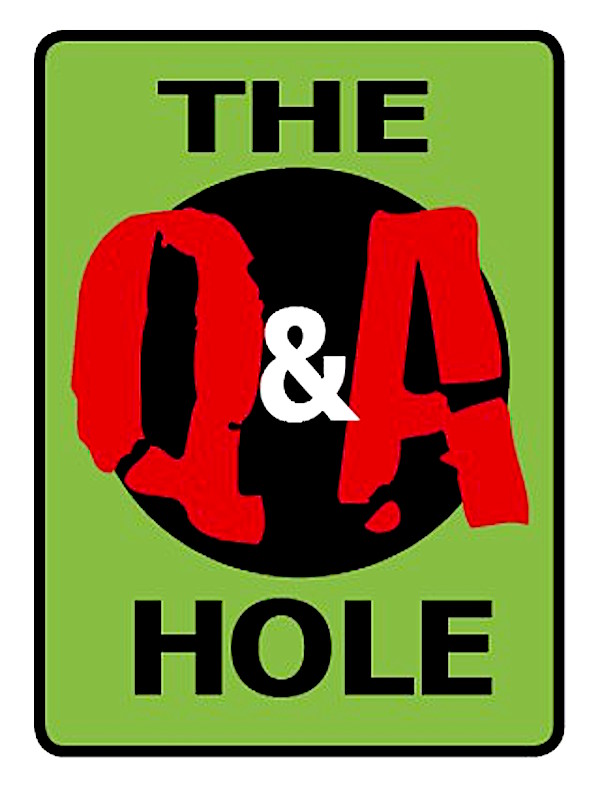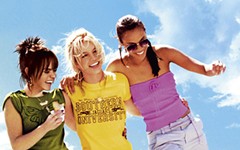The Q&A Hole: What Got You Hooked On the Weird Stuff?
Waiting for the manlike creature with the glowing eyes
By Wayne Alan Brenner, 6:00AM, Thu. Jul. 13, 2017
Compare the joy of reading to a sort of addiction and you can find a gateway drug in there somewhere. (In the case of science fiction, maybe a person’s gateway was even Frederik Pohl’s excellent 1977 novel Gateway.) And since we always like to know where the good stuff is, we invoked our ongoing series to ask this recent gathering of SFF writers:

WHAT STORY FIRST GOT YOU HOOKED ON YOUR FAVORITE LITERARY GENRE?
Nicky Drayden: Stephen King's The Eyes of the Dragon mesmerized 12-year-old me. I can still remember how vivid the scenes were in my mind – feeling the knots in the too-thin rope Peter used to escape from the tower, and especially the description of Frisky's canine sense of smell as he followed streaks of electric blue across the landscape. It was the first time I realized how powerful words could be.
Christopher Brown: Ray Bradbury's The Illustrated Man and Robert E. Howard's Conan of Cimmeria, as an 11-year-old; Kurt Vonnegut's Slaughterhouse-Five, as a 14-year-old; and J.G. Ballard's Crash and Doris Lessing's Shikasta, as a 17-year-old.
Nate Southard: Stephen King's first collection, Night Shift. It's full of good, pulpy fun without sacrificing character. There's so much imagination in there, and sometimes the tiniest details a character recalls are more terrifying than the main thrust of the story. It was a huge eye-opener.
John Gibbons: Showing my age, but Robert Heinlein's juveniles and Isaac Asimov's Foundation trilogy. Sense of wonder!
Jennifer Juday: As a kid? I loved picture books and still do, so I could list a bunch of those. I think Dr. Seuss and Maurice Sendak can totally be a gateway drug for the rest of SFF! The Arabian Nights. Perrault's Fairy Tales (the Dover edition with hair-raising pictures by Gustave Doré: I would sneak it off a tall shelf and look at those pictures and be mildly terrified). Ursula K. Le Guin's Wizard of Earthsea. Madeleine L'Engle's A Wrinkle in Time. The Lord of the Rings (read it in fourth grade after a stepsister said I was too young; it launched me into the adult section of the library).
Eugene Fischer: Both of my parents were SF fans; I had Tolkien and Heinlein as bedtime stories before I started reading books on my own. The first SF novels I read on my own were Robert Heinlein's Have Space Suit – Will Travel and James H. Schmitz's The Witches of Karres. I think the first influential genre books I found on my own rather than in my parents' library were Bruce Coville's My Teacher Is an Alien series. I became a devoted fan, read everything Coville published for years.
Jessica Reisman: Samuel R. Delany's Babel-17, Le Guin's first Earthsea book, the Lord of the Rings books – and all the Arthurian cycle versions I could find on the dusty back shelves of the school library.
Marshall Ryan Maresca: As a kid, my mother read Journey to the Center of the Earth to me, and that's something that always stuck with me. Same with the Narnia books. But it was later, reading Zilpha Keatley Snyder's Green Sky trilogy on my own, that was my real genre gateway.
Stina Leicht: For me it was a combination of A Wrinkle in Time by Madeleine L'Engle – I’ve still got my original Scholastic paperback – Zilpha Keatley Snyder's novels, Alfred Hitchcock's Haunted Houseful, 20,000 Leagues Under the Sea by Jules Verne, War of the Worlds by H.G. Wells, and The Lord of the Rings by J.R.R. Tolkien. Of those, A Wrinkle in Time was the most important – because it showed me that women could be scientists, not just mothers. That really sparked my imagination.
Skyler White: I found fantasy long before SF. The Narnia books, followed by Mary Stewart's Arthurian trilogy and everything L'Engle wrote – although I think she's a bit of a F/SF crossover. First pure SF to blow my mind was probably Michael Crichton's The Andromeda Strain. My son, weirdly, had the reverse experience: I started him on fantasy, but it wasn't until he read SF that his hair really caught fire. Cory Doctorow’s Little Brother is still his favorite book of all time.
David Chang: Yes on Le Guin and Tolkien. Also formative for me were Lloyd Alexander's Prydain, Fritz Leiber's Lankhmar, Harry Harrison's Rat, and Roger Zelazny's Amber.
William Browning Spencer: Dracula by Bram Stoker. I read this when I was a kid, and its haunted late-Victorian eroticism ruined me for other vampire novels. I was maybe 20 years older when I read Interview With the Vampire and it seemed utterly silly, and I thought I’d re-read Dracula to see if blood-sucking immortals were, by definition, ludicrous. They weren’t. In a series of letters, diaries, and sundry found items, Stoker creates this claustrophobic irrational world in which something darkly addictive has possessed these pale, besieged women – Oh Lucy! Oh Mina! – these women with their new, unspeakable knowledge. I think it’s the unspeakable aspect that hooked me. What a great Victorian reticence this is – and how ghastly the cure that requires holy water, garlic, wooden stakes, and decapitation! This novel found me, the way novels that share our temperament find us writers. I’d probably be writing horror and fantasy and science fiction without this novel’s influence, but it taught me the power of a narrative that slowly, inexorably reveals itself. Come to think of it, this may explain my fondness for Lovecraft.
A note to readers: Bold and uncensored, The Austin Chronicle has been Austin’s independent news source for over 40 years, expressing the community’s political and environmental concerns and supporting its active cultural scene. Now more than ever, we need your support to continue supplying Austin with independent, free press. If real news is important to you, please consider making a donation of $5, $10 or whatever you can afford, to help keep our journalism on stands.
March 22, 2024
March 22, 2024
Q&A Hole, Austin authors, Drayden, Brown, Leicht, Spencer, Chang, Reisman, White, Maresca, Southard, Gibbons, Juday, gateway books, Asimov, Heinlein, Le Guin, L'Engle, Tolkien








